Business and Corporations Law
VerifiedAdded on 2023/04/21
|5
|1306
|284
AI Summary
This document provides legal advice on contract issues related to the sale of vehicles. It discusses mutual mistake, unilateral mistake, invitation to treat, and provides case law examples. It concludes with the analysis of four specific scenarios.
Contribute Materials
Your contribution can guide someone’s learning journey. Share your
documents today.
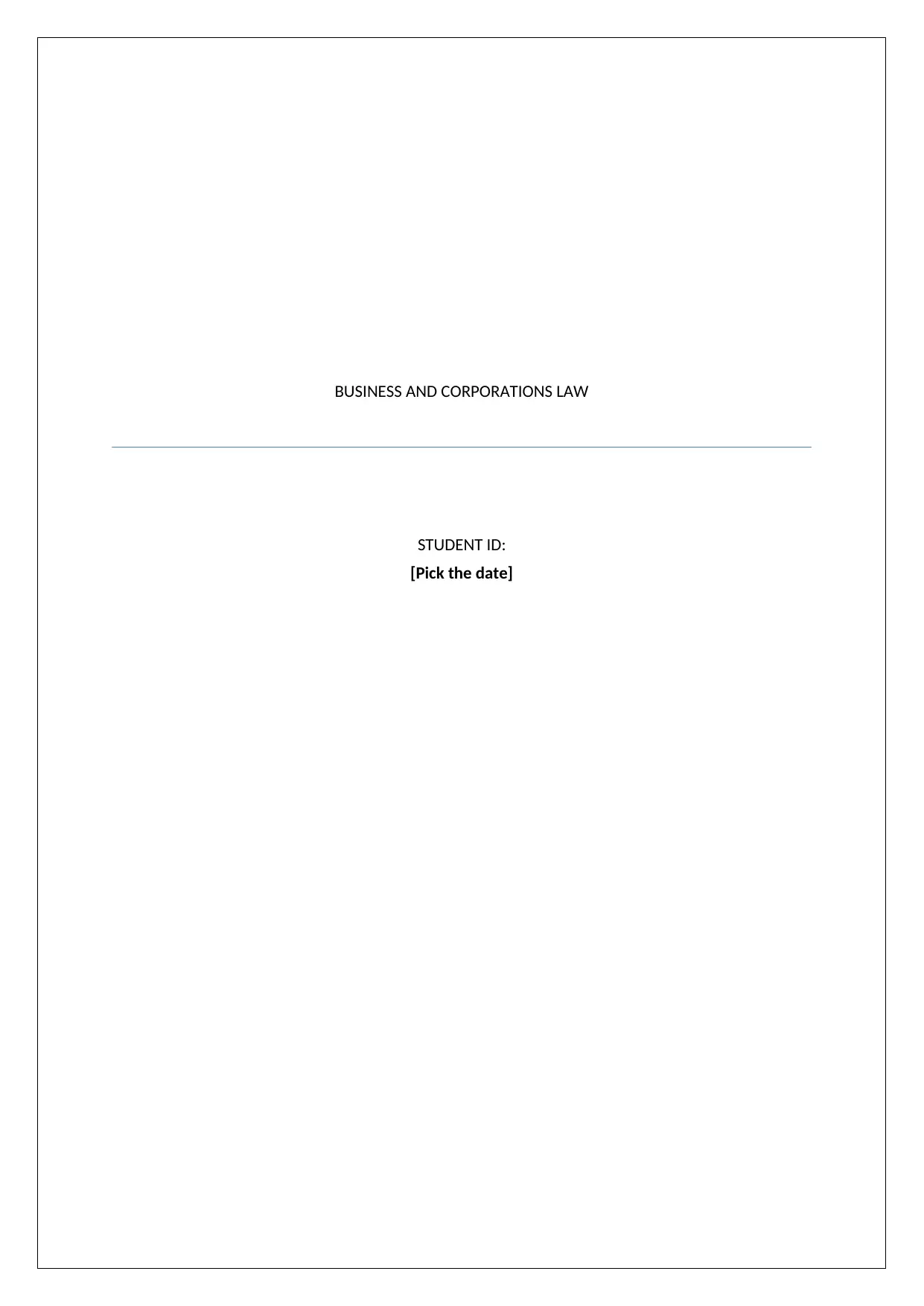
BUSINESS AND CORPORATIONS LAW
STUDENT ID:
[Pick the date]
STUDENT ID:
[Pick the date]
Secure Best Marks with AI Grader
Need help grading? Try our AI Grader for instant feedback on your assignments.
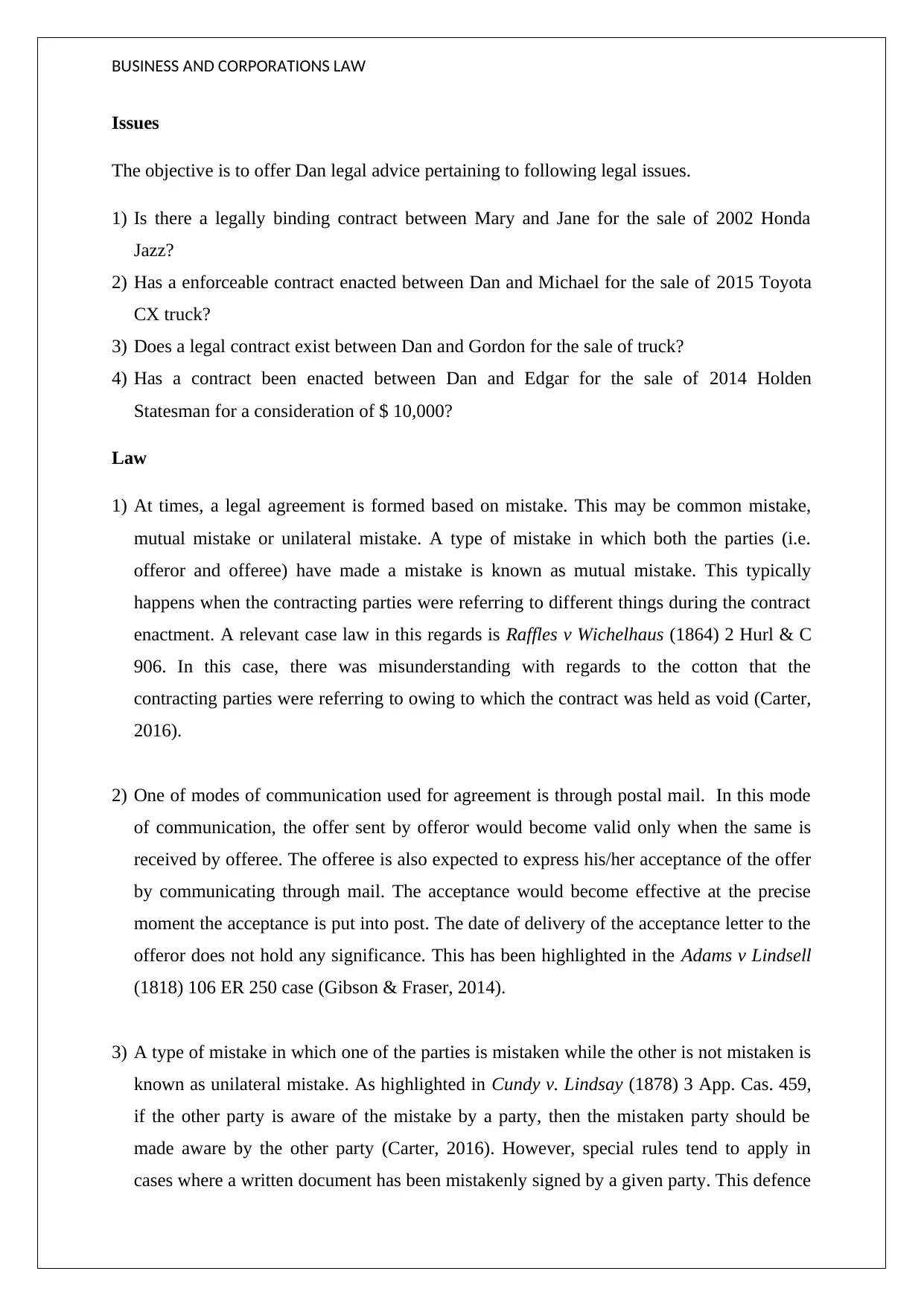
BUSINESS AND CORPORATIONS LAW
Issues
The objective is to offer Dan legal advice pertaining to following legal issues.
1) Is there a legally binding contract between Mary and Jane for the sale of 2002 Honda
Jazz?
2) Has a enforceable contract enacted between Dan and Michael for the sale of 2015 Toyota
CX truck?
3) Does a legal contract exist between Dan and Gordon for the sale of truck?
4) Has a contract been enacted between Dan and Edgar for the sale of 2014 Holden
Statesman for a consideration of $ 10,000?
Law
1) At times, a legal agreement is formed based on mistake. This may be common mistake,
mutual mistake or unilateral mistake. A type of mistake in which both the parties (i.e.
offeror and offeree) have made a mistake is known as mutual mistake. This typically
happens when the contracting parties were referring to different things during the contract
enactment. A relevant case law in this regards is Raffles v Wichelhaus (1864) 2 Hurl & C
906. In this case, there was misunderstanding with regards to the cotton that the
contracting parties were referring to owing to which the contract was held as void (Carter,
2016).
2) One of modes of communication used for agreement is through postal mail. In this mode
of communication, the offer sent by offeror would become valid only when the same is
received by offeree. The offeree is also expected to express his/her acceptance of the offer
by communicating through mail. The acceptance would become effective at the precise
moment the acceptance is put into post. The date of delivery of the acceptance letter to the
offeror does not hold any significance. This has been highlighted in the Adams v Lindsell
(1818) 106 ER 250 case (Gibson & Fraser, 2014).
3) A type of mistake in which one of the parties is mistaken while the other is not mistaken is
known as unilateral mistake. As highlighted in Cundy v. Lindsay (1878) 3 App. Cas. 459,
if the other party is aware of the mistake by a party, then the mistaken party should be
made aware by the other party (Carter, 2016). However, special rules tend to apply in
cases where a written document has been mistakenly signed by a given party. This defence
Issues
The objective is to offer Dan legal advice pertaining to following legal issues.
1) Is there a legally binding contract between Mary and Jane for the sale of 2002 Honda
Jazz?
2) Has a enforceable contract enacted between Dan and Michael for the sale of 2015 Toyota
CX truck?
3) Does a legal contract exist between Dan and Gordon for the sale of truck?
4) Has a contract been enacted between Dan and Edgar for the sale of 2014 Holden
Statesman for a consideration of $ 10,000?
Law
1) At times, a legal agreement is formed based on mistake. This may be common mistake,
mutual mistake or unilateral mistake. A type of mistake in which both the parties (i.e.
offeror and offeree) have made a mistake is known as mutual mistake. This typically
happens when the contracting parties were referring to different things during the contract
enactment. A relevant case law in this regards is Raffles v Wichelhaus (1864) 2 Hurl & C
906. In this case, there was misunderstanding with regards to the cotton that the
contracting parties were referring to owing to which the contract was held as void (Carter,
2016).
2) One of modes of communication used for agreement is through postal mail. In this mode
of communication, the offer sent by offeror would become valid only when the same is
received by offeree. The offeree is also expected to express his/her acceptance of the offer
by communicating through mail. The acceptance would become effective at the precise
moment the acceptance is put into post. The date of delivery of the acceptance letter to the
offeror does not hold any significance. This has been highlighted in the Adams v Lindsell
(1818) 106 ER 250 case (Gibson & Fraser, 2014).
3) A type of mistake in which one of the parties is mistaken while the other is not mistaken is
known as unilateral mistake. As highlighted in Cundy v. Lindsay (1878) 3 App. Cas. 459,
if the other party is aware of the mistake by a party, then the mistaken party should be
made aware by the other party (Carter, 2016). However, special rules tend to apply in
cases where a written document has been mistakenly signed by a given party. This defence
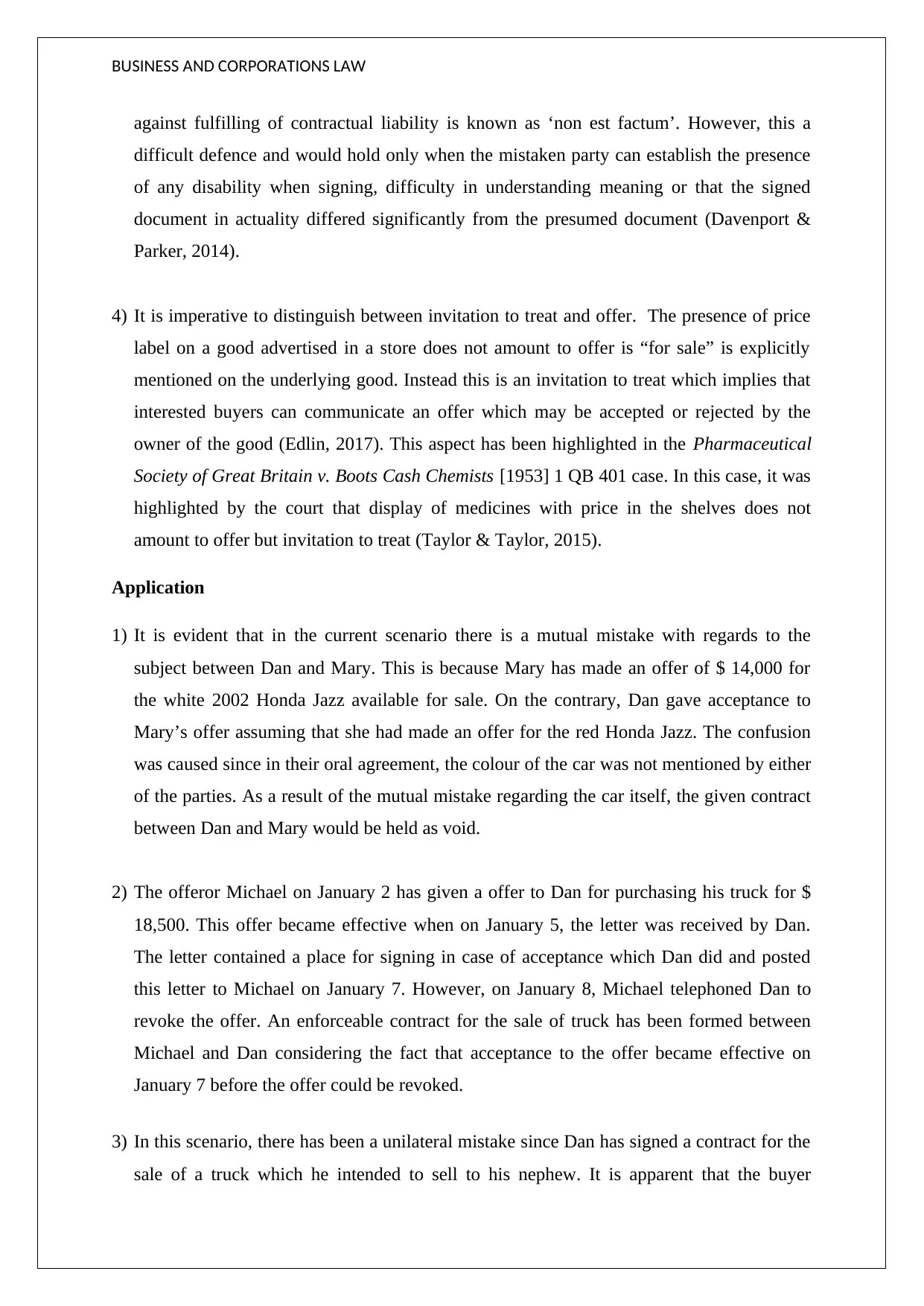
BUSINESS AND CORPORATIONS LAW
against fulfilling of contractual liability is known as ‘non est factum’. However, this a
difficult defence and would hold only when the mistaken party can establish the presence
of any disability when signing, difficulty in understanding meaning or that the signed
document in actuality differed significantly from the presumed document (Davenport &
Parker, 2014).
4) It is imperative to distinguish between invitation to treat and offer. The presence of price
label on a good advertised in a store does not amount to offer is “for sale” is explicitly
mentioned on the underlying good. Instead this is an invitation to treat which implies that
interested buyers can communicate an offer which may be accepted or rejected by the
owner of the good (Edlin, 2017). This aspect has been highlighted in the Pharmaceutical
Society of Great Britain v. Boots Cash Chemists [1953] 1 QB 401 case. In this case, it was
highlighted by the court that display of medicines with price in the shelves does not
amount to offer but invitation to treat (Taylor & Taylor, 2015).
Application
1) It is evident that in the current scenario there is a mutual mistake with regards to the
subject between Dan and Mary. This is because Mary has made an offer of $ 14,000 for
the white 2002 Honda Jazz available for sale. On the contrary, Dan gave acceptance to
Mary’s offer assuming that she had made an offer for the red Honda Jazz. The confusion
was caused since in their oral agreement, the colour of the car was not mentioned by either
of the parties. As a result of the mutual mistake regarding the car itself, the given contract
between Dan and Mary would be held as void.
2) The offeror Michael on January 2 has given a offer to Dan for purchasing his truck for $
18,500. This offer became effective when on January 5, the letter was received by Dan.
The letter contained a place for signing in case of acceptance which Dan did and posted
this letter to Michael on January 7. However, on January 8, Michael telephoned Dan to
revoke the offer. An enforceable contract for the sale of truck has been formed between
Michael and Dan considering the fact that acceptance to the offer became effective on
January 7 before the offer could be revoked.
3) In this scenario, there has been a unilateral mistake since Dan has signed a contract for the
sale of a truck which he intended to sell to his nephew. It is apparent that the buyer
against fulfilling of contractual liability is known as ‘non est factum’. However, this a
difficult defence and would hold only when the mistaken party can establish the presence
of any disability when signing, difficulty in understanding meaning or that the signed
document in actuality differed significantly from the presumed document (Davenport &
Parker, 2014).
4) It is imperative to distinguish between invitation to treat and offer. The presence of price
label on a good advertised in a store does not amount to offer is “for sale” is explicitly
mentioned on the underlying good. Instead this is an invitation to treat which implies that
interested buyers can communicate an offer which may be accepted or rejected by the
owner of the good (Edlin, 2017). This aspect has been highlighted in the Pharmaceutical
Society of Great Britain v. Boots Cash Chemists [1953] 1 QB 401 case. In this case, it was
highlighted by the court that display of medicines with price in the shelves does not
amount to offer but invitation to treat (Taylor & Taylor, 2015).
Application
1) It is evident that in the current scenario there is a mutual mistake with regards to the
subject between Dan and Mary. This is because Mary has made an offer of $ 14,000 for
the white 2002 Honda Jazz available for sale. On the contrary, Dan gave acceptance to
Mary’s offer assuming that she had made an offer for the red Honda Jazz. The confusion
was caused since in their oral agreement, the colour of the car was not mentioned by either
of the parties. As a result of the mutual mistake regarding the car itself, the given contract
between Dan and Mary would be held as void.
2) The offeror Michael on January 2 has given a offer to Dan for purchasing his truck for $
18,500. This offer became effective when on January 5, the letter was received by Dan.
The letter contained a place for signing in case of acceptance which Dan did and posted
this letter to Michael on January 7. However, on January 8, Michael telephoned Dan to
revoke the offer. An enforceable contract for the sale of truck has been formed between
Michael and Dan considering the fact that acceptance to the offer became effective on
January 7 before the offer could be revoked.
3) In this scenario, there has been a unilateral mistake since Dan has signed a contract for the
sale of a truck which he intended to sell to his nephew. It is apparent that the buyer
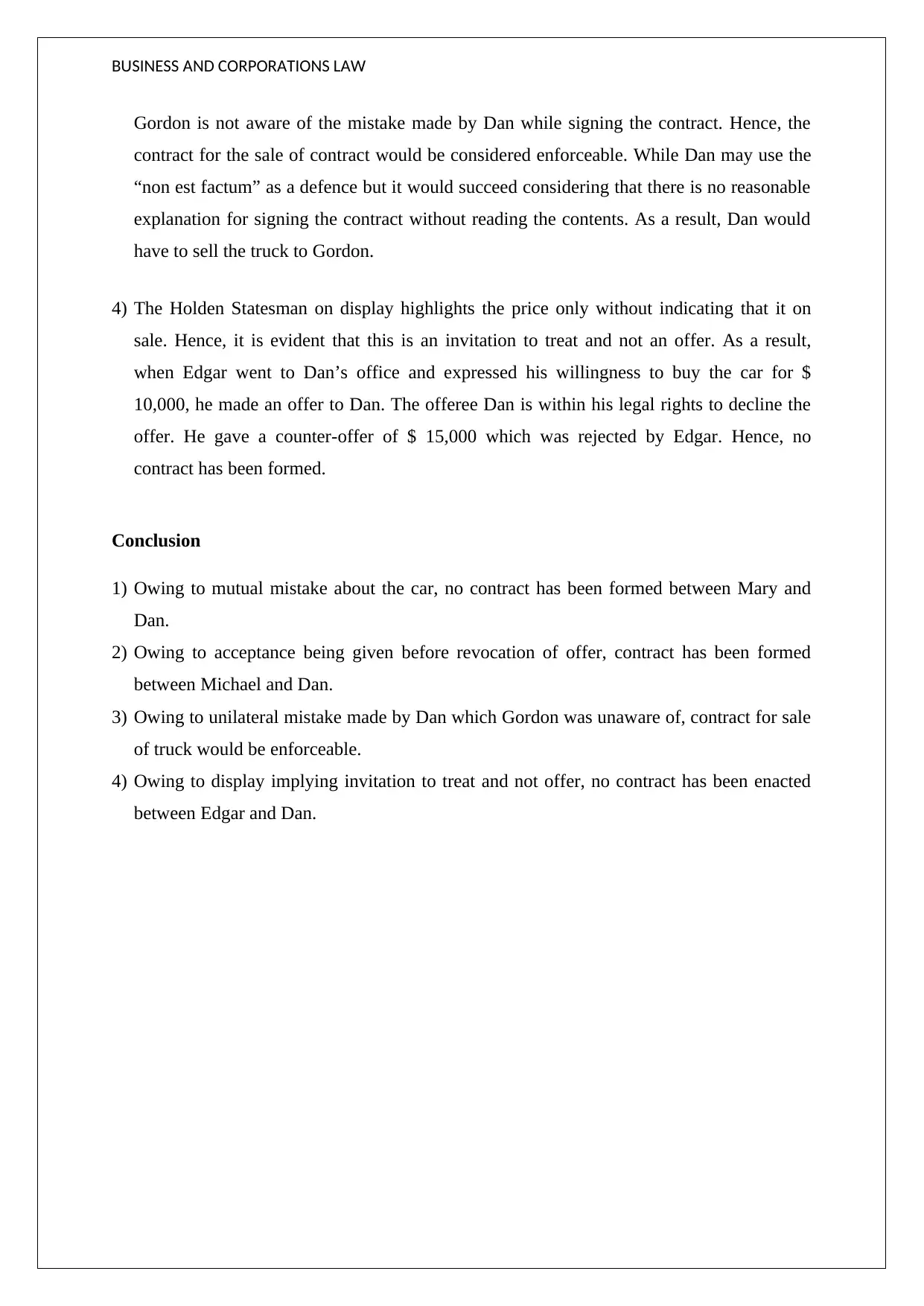
BUSINESS AND CORPORATIONS LAW
Gordon is not aware of the mistake made by Dan while signing the contract. Hence, the
contract for the sale of contract would be considered enforceable. While Dan may use the
“non est factum” as a defence but it would succeed considering that there is no reasonable
explanation for signing the contract without reading the contents. As a result, Dan would
have to sell the truck to Gordon.
4) The Holden Statesman on display highlights the price only without indicating that it on
sale. Hence, it is evident that this is an invitation to treat and not an offer. As a result,
when Edgar went to Dan’s office and expressed his willingness to buy the car for $
10,000, he made an offer to Dan. The offeree Dan is within his legal rights to decline the
offer. He gave a counter-offer of $ 15,000 which was rejected by Edgar. Hence, no
contract has been formed.
Conclusion
1) Owing to mutual mistake about the car, no contract has been formed between Mary and
Dan.
2) Owing to acceptance being given before revocation of offer, contract has been formed
between Michael and Dan.
3) Owing to unilateral mistake made by Dan which Gordon was unaware of, contract for sale
of truck would be enforceable.
4) Owing to display implying invitation to treat and not offer, no contract has been enacted
between Edgar and Dan.
Gordon is not aware of the mistake made by Dan while signing the contract. Hence, the
contract for the sale of contract would be considered enforceable. While Dan may use the
“non est factum” as a defence but it would succeed considering that there is no reasonable
explanation for signing the contract without reading the contents. As a result, Dan would
have to sell the truck to Gordon.
4) The Holden Statesman on display highlights the price only without indicating that it on
sale. Hence, it is evident that this is an invitation to treat and not an offer. As a result,
when Edgar went to Dan’s office and expressed his willingness to buy the car for $
10,000, he made an offer to Dan. The offeree Dan is within his legal rights to decline the
offer. He gave a counter-offer of $ 15,000 which was rejected by Edgar. Hence, no
contract has been formed.
Conclusion
1) Owing to mutual mistake about the car, no contract has been formed between Mary and
Dan.
2) Owing to acceptance being given before revocation of offer, contract has been formed
between Michael and Dan.
3) Owing to unilateral mistake made by Dan which Gordon was unaware of, contract for sale
of truck would be enforceable.
4) Owing to display implying invitation to treat and not offer, no contract has been enacted
between Edgar and Dan.
Secure Best Marks with AI Grader
Need help grading? Try our AI Grader for instant feedback on your assignments.
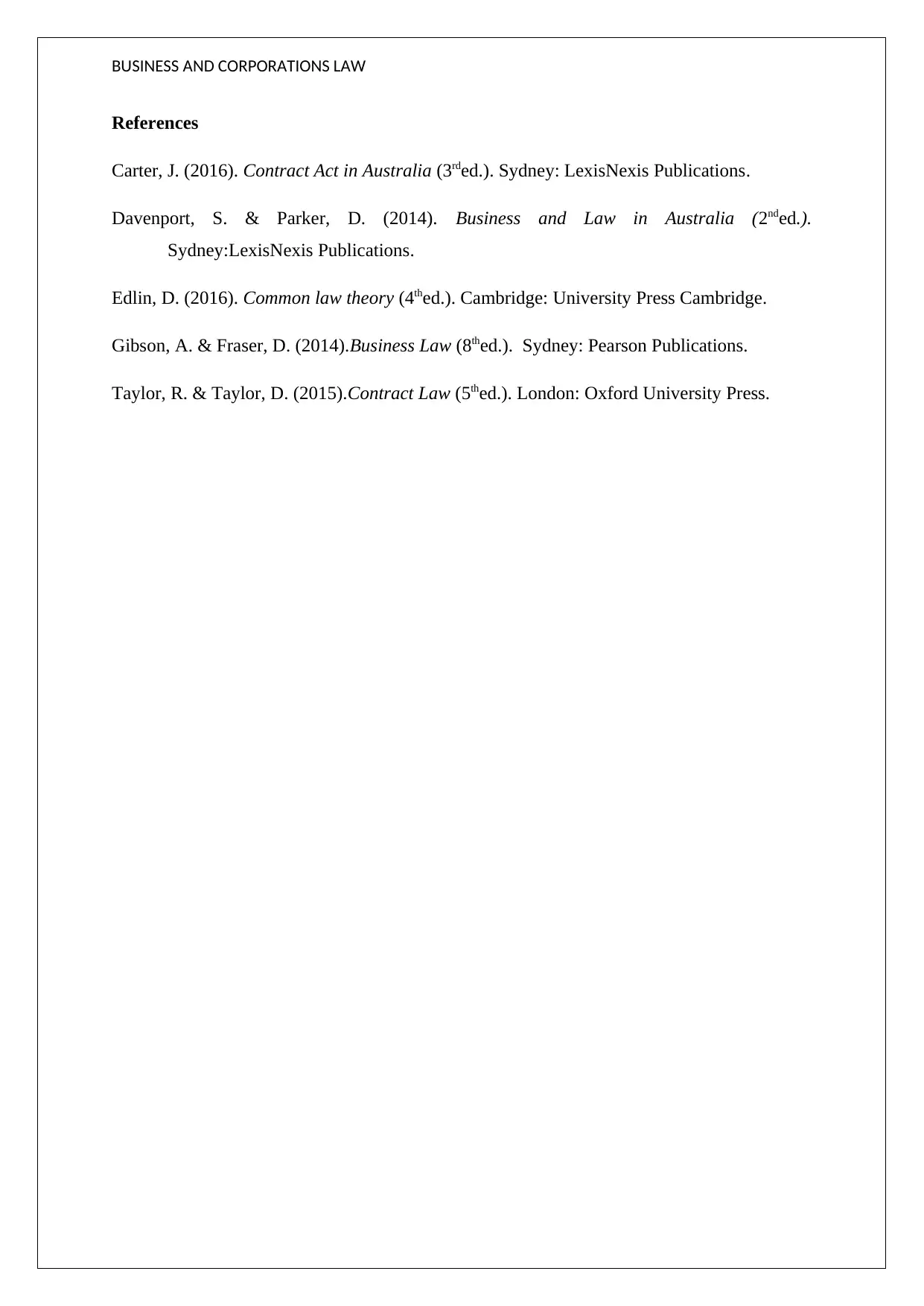
BUSINESS AND CORPORATIONS LAW
References
Carter, J. (2016). Contract Act in Australia (3rded.). Sydney: LexisNexis Publications.
Davenport, S. & Parker, D. (2014). Business and Law in Australia (2nded.).
Sydney:LexisNexis Publications.
Edlin, D. (2016). Common law theory (4thed.). Cambridge: University Press Cambridge.
Gibson, A. & Fraser, D. (2014).Business Law (8thed.). Sydney: Pearson Publications.
Taylor, R. & Taylor, D. (2015).Contract Law (5thed.). London: Oxford University Press.
References
Carter, J. (2016). Contract Act in Australia (3rded.). Sydney: LexisNexis Publications.
Davenport, S. & Parker, D. (2014). Business and Law in Australia (2nded.).
Sydney:LexisNexis Publications.
Edlin, D. (2016). Common law theory (4thed.). Cambridge: University Press Cambridge.
Gibson, A. & Fraser, D. (2014).Business Law (8thed.). Sydney: Pearson Publications.
Taylor, R. & Taylor, D. (2015).Contract Law (5thed.). London: Oxford University Press.
1 out of 5
Related Documents
Your All-in-One AI-Powered Toolkit for Academic Success.
+13062052269
info@desklib.com
Available 24*7 on WhatsApp / Email
![[object Object]](/_next/static/media/star-bottom.7253800d.svg)
Unlock your academic potential
© 2024 | Zucol Services PVT LTD | All rights reserved.




